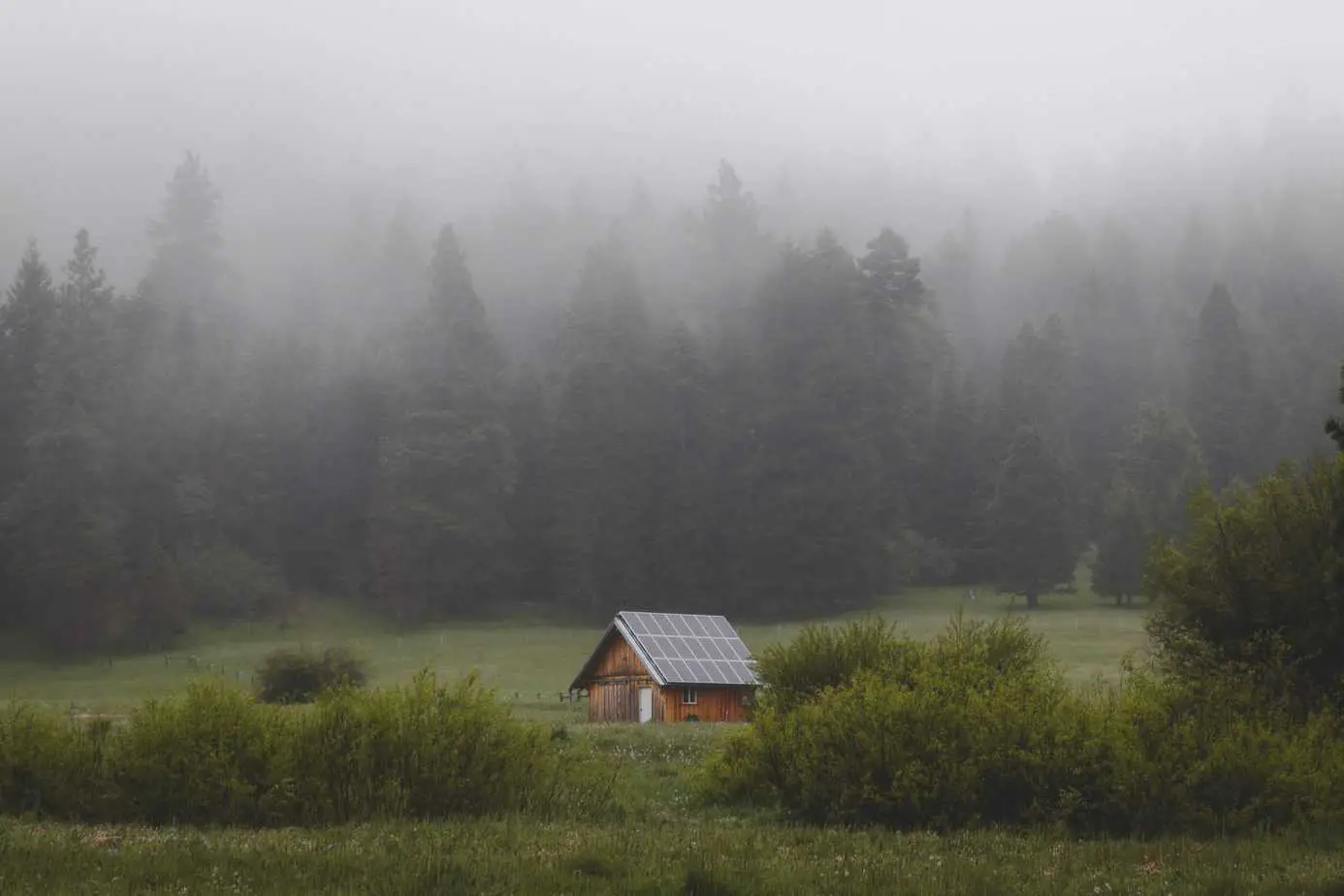It’s obvious that no one really agrees on an answer to “what does it mean to live off-grid?” In fact, if you want to start an argument in any off-grid group on social media, simply ask why people living off the grid are on social media and using technology.
Recently, thanks to COVID 19, I’ve had more time than usual to ponder this. I’ve read the things others have to say on the subject. It’s clear the answer is unclear. Tempers really do flare when people challenge anyone else’s idea of what off-grid means. I’m going to propose a whole new definition.
Definition of Off-Grid
In reality, off-grid living has been around since the days the “grid” got started. The ‘grid’ refers to the power grid. Once that electrical line is hooked into a utility box at your home, you are officially on the grid.
In early times across the United States, it was not unheard of for homes to be without power. Especially in rural farming and ranching areas, there were many people who were simply too far from power lines to ever be connected to the grid. In some places, this is still the case. It’s just a lot rarer now.
In time, the grid grew and utility companies ultimately became very wealthy. They extended lines, installed poles, and dotted the landscape with towers that conducted power lines from one side of the country to the other. In some states, it is illegal to be living without electricity hooked to your home!
Right here, in America, the land of the free, we’re losing the right to live free of power lines!
Why Some People Choose to Live Off-Grid Today
Ask ten different people this question and you’ll likely get ten different answers. It’s a very personal choice and this is why there are varying degrees of what people consider being “off-grid” today.
For some, it’s a statement. It’s about freedom. For others, it’s a financial decision. Some do it for the simplistic life they long for.
Some people choose to live without electricity, but have running water and are hooked to city water with a septic system or a well with sewer lines. This is their choice and it is neither right nor wrong.
None of these things are right or wrong. There is no litmus test for ‘how off-grid is enough off-grid?’ We should recognize it for what it truly is – freedom.
“Living off-grid is less a state of being and more a state of mind.”
If you have a desire to do things your way, to live more simply and test your ability to be self-sufficient, then off-grid living can be for you. There are no rules; it’s about being free.
Living Off-Grid The Way You Choose

Being off-grid to the level you choose is up to you. Some people slowly go off the grid by first cutting ties with power for heat and going to a wood-burning stove for winter warmth.
Others begin cutting their grocery bills by planting huge gardens and greenhouses. Saving hundreds or even thousands of dollars each year in groceries for their families, so they can take the next steps in achieving their freedom.
For some, it’s a desire to prove they can make it as the pioneers once did. Some people will homestead a new piece of raw land, set-up some solar panels, add a water collection tank, and live completely unplugged.
A few still access the internet with cell phones and laptops, charging them with their solar panels or their wind generators spinning on top of the cabin. They are allowed to experience freedom in their own way. Remember, it’s a state of mind.
Some People Walk Away From Everything
Some folks walk away from all technology and go, full-on backwoodsman. They hunt, fish, till crops, chop firewood, and totally live off their land. These frontier folk wouldn’t dream of using a generator or using an LP heater in the winter.
I take my hat off to them. It’s not an easy life no matter which degree of off-grid you are, but fully off the grid, with no cell phone, no computer, television, or modern convenience at all…that’s hardcore.
With all the respect I feel for them (and I really do), I still will remind them that they are no more or less off-grid than anyone else. It’s what’s in your heart; the feeling of being free to do things the way you want.
Sometimes, it is about rebelling against a system of which county or state mandates tell you what you have to do. Some are just tired of being told what they have to do.
Nobody living off-grid will ever have an HOA send them a letter to paint their house or mow their lawn. My lawn is a four-foot-high meadow right now, full of Black-eyed Susans. The butterflies, birds, rabbits, and other wildlife all live here with me. We share it and that’s what off-grid means to me.


You’ve Thought About Living Off-Grid But…
There is always a ‘but’, and I don’t care who you are. You have questions and that is a very good thing. If you didn’t have questions, it’s possible you aren’t taking living off-grid with the seriousness it deserves.
I’ve seen hundreds of questions and I’d like to try to answer them here. Some of the questions are really good and you should truly take heed.
Q&A For Living Off-Grid
Can I live off-grid anywhere?
No, unfortunately not. As indicated above, many jurisdictions and states have laws that actually make living off the grid illegal.
The best states for living off-grid are Missouri and Texas. Other states have areas that are off-grid friendly, to include: Tennessee, Washington, Montana, New Mexico, Arizona, and Oklahoma.
The keyword to look for in ads is “unrestricted” because this tells you that there are few, if any, rules or covenants in regard to the use of the property.
Of all the states listed above, Missouri is the least regulated and even encourages living off-grid.
How much land do I need to live self-reliantly?
You should get the largest plot you can afford. There are a few reasons for this.
Neighbors that are too close to you might spray pesticides on their lawn and if you are living naturally and organically, this will drift to your gardens.
Noise from neighbors and their dogs may become problematic. Even people who are just loud and blare music or have loud cars can be annoying when you are trying to live peacefully.
Do not, under any circumstances, purchase land that has not been properly surveyed and marked. This will save you a lot of hassle. You also want to make sure you have guaranteed access to your land. Landlocked property is useless.
Investigate the laws for pets and livestock. For example, living off-grid in most rural Oklahoma counties is perfectly fine, but so is letting your dogs run at large. It is required for you to fence out stray dogs. If you are raising chickens, this is a hassle.
You need to buy enough land to grow the amount of food you want and raise the livestock you want. Make sure it is the right piece of property. Don’t just jump on the first thing you see.
Can I live off-grid and still work in the city?
Of course, you can. The trick is to find a property that is country but close to work. This is a good reason to consider Missouri. There are many rural areas that are near enough to small cities that can provide work.
A lot of people begin living on their homestead and continue to hold a job while they fund the things they need to get done. In time, if your goal is to live and work from home, you can find a way to do it after you’ve got your plan in action.
What if I need power? What are my options?

You have many options to have power. In fact, if you’ve got enough money to invest, you can have all the power you want. Going with a solar system that powers what you need, complete with the appliances you are used to, can cost thousands of dollars.
If you are willing to give up the toaster, the microwave, the full-sized fridge, and limit the television time, you can get by with 4 to 10 solar panels that you install yourself. Research them and learn how to hook it all up yourself or bring in someone to hook it up after you buy what you need.
Wind power generators are an option but don’t supply as much power as solar panels. Many people choose to add one to their solar system, creating a hybrid system that gives some charging to your batteries at night as well. It’s always a great idea to have more than one power generating option.
A gasoline generator is a good back-up source of power and could even be your main power source if you choose. Generators can range in price from a couple of hundred dollars up to thousands of dollars. Some generators will run on gasoline, others on diesel, and some that utilize propane.
What is the most important thing to do when moving off-grid?
You’ll want to consider these things. Think:
- Shelter
- Water
- Power
- Food
What sort of home will you live in and how will you get supplies to your land? If you choose a very remote location, it will be more challenging to build a home. Getting supplies such as lumber and roofing materials might be impossible.
Are there trees to build a cabin from? Can you build a sandbag home? Cob? Get that settled to protect you from the weather first and foremost. Being sheltered from the elements is life or death. It comes first.
Next, set up a water source. You can drill a well – very expensive and not an option for all. You can set up gutters and run them to a large tank or cistern to collect rainwater. If you choose this method, make sure the area you’ve moved to will rain enough to make it feasible and that water collection is legal there. If you found a property with a running water source already on it, great job!
We’ve already discussed your power options. Decide and get that in place. Now, what about the food? Can you grow food? Will you need raised beds due to poor soil? Is a greenhouse an option?
Are you able to hunt or fish? Are you close enough to purchase supplies in town until you are on your feet? Even if you only make this trip a few times per year, it’s good to have a backup plan.
That Feeling In Your Gut
If you have a desire to live self-sufficiently and get off-grid, then there’s no better time to start than now. Don’t let anyone bully you into thinking you must give up your cell phone or your television.
You can find a way to make things happen without being hooked to the power grid. You can keep your phone and check-in on social media. You are still just as off-grid as the next person because there is no right or wrong!
It’s really about the feeling you get when you sit on your porch at night, watching the stars twinkle; when you pick your first fresh tomatoes and make a salad from your garden to enjoy with fried chicken that you raised yourself; when you watch your kids chasing fireflies instead of watching cartoons.
It’s a feeling in your gut that tells you that you are right where you are meant to be, as free as you’ll ever be. You’ll know deep in your gut that you never want to go back. That’s freedom…and that’s off-grid.

